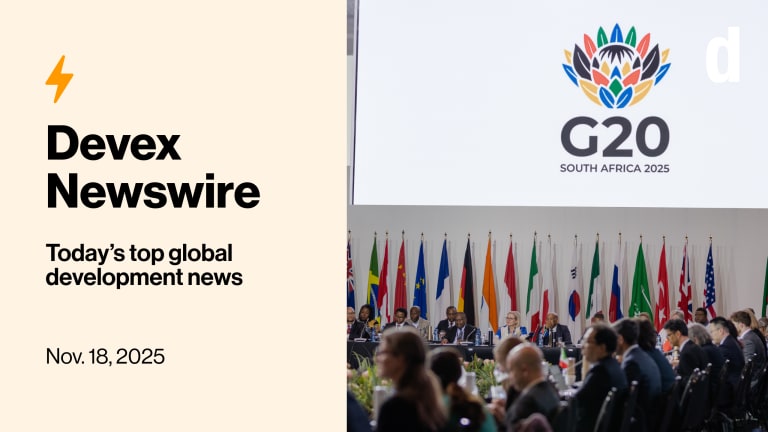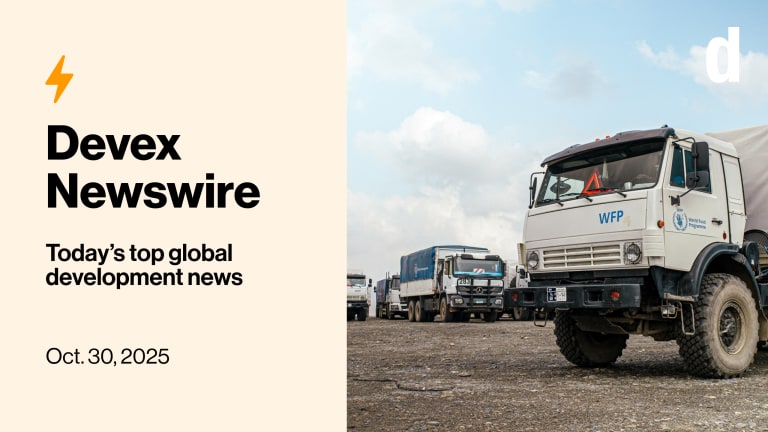
Russia’s war on Ukraine is driving a wedge between Europe and Africa, and some European officials are wondering if that means they need to take a more “transactional” approach to development.
Also in today’s edition: A dispute over the causes of water scarcity in Kenya, and WHO’s monkeypox declaration.
In a confidential report circulated among diplomats in Brussels and obtained by my colleague Vince Chadwick, European officials suggest that the geopolitical and economic ripples of the war in Ukraine are driving Africa and Europe farther apart — and that the European Union is losing the battle for hearts and minds in Africa over the conflict.
This is a preview of Newswire
Sign up to this newsletter for an inside look at the biggest stories in global development, in your inbox daily.
“The EU’s reputation as being a mediator, a peacemaker, is eroding due to the Union’s military assistance to Ukraine,” they write. “In Africa, the EU is seen as fuelling the conflict, not as a peace facilitator.”
That is all made more complicated by the perception among some on the African continent that European sanctions against Russia and other fallout from the conflict could be fueling the food security crisis, economic shocks, and resulting instability, the document suggests.
Russian Foreign Minister Sergei Lavrov is currently in Africa, meeting with heads of state in part to convince them that the West, not Russia, is to blame for food price spikes and shortages. His tour is believed to be part of preparations for a second Africa-Russia summit in November.
“Many AUMS [African Union member states] do not identify an interest in taking sides in what they perceive as an ‘East-West’ conflict,” the EU report reads.
“The colonial and post-colonial legacies, including historical ties of a good range of countries with the Soviet Union and subsequently Russia, strongly influence mindsets and positions, as do perceived Western double standards. Furthermore, AUMS are concerned about Russian pressure on them.”
Exclusive: Internal report shows EU fears losing Africa over Ukraine
More on the EU: EU makes Pacific power play in Kiribati
Up in smoke
Just one day after United Nations officials celebrated Friday’s deal to get Ukrainian grain out of the country, Russia fired four long-range missiles at the port of Odesa, where much of that grain is currently stored.
The Washington Post’s editorial board points out that this is standard procedure for Russian President Vladimir Putin — agree to a humanitarian corridor, only to turn around and immediately violate it.
On Friday, U.N. Secretary-General António Guterres described the grain export agreement as “probably the most important thing I’ve been doing since I became Secretary General.” On Saturday Guterres’ spokesperson said the U.N. chief “unequivocally condemns” the strikes.
ICYMI: Beasley celebrates Ukraine grain deal; shipments to start within weeks
Spending and saving
Save the Children International saw its income jump 15% to $1.3 billion in 2021 compared to the year before. Donations from member organizations in the United States rose by about $95 million, but the fastest growing contributions came from Italy, which doubled funding from $35.3 million to $71.8 million.
Read more: Save the Children International sees 15% spike in income in 2021 (Pro)
+ A Devex Pro membership offers deeper analysis of the development sector, exclusive digital events, and access to the world’s largest global development job board. Try it out today by signing up to our 15-day free trial.
This report marks the debut Devex byline for my new colleague Omar Mohammed. Originally from Tanzania, Omar will be covering the business side of U.S. foreign assistance from his new home in New York City, and eventually, Washington, D.C. Follow his reporting, share story ideas and tips, or just welcome him to Devex at @shurufu or omar.mohammed@devex.com.
Shadow of a drought
“Those passing the blame are funded by the same sources who are responsible for worsening effects of climate change.”
— Justus Lavi, general secretary, Kenya Small Scale Farmers ForumSmallholder farmers and environmental nonprofits are locked in a dispute over the causes of water resource degradation in Kenya, David Njagi reports for Devex.
“Environmental researchers said a lack of consensus between farming communities and nonprofit groups on what is ailing Kenya’s water sources and how to save them is making it difficult to decide on a workable action plan to save water sources while ensuring farmers continue producing food through their established agriculture systems,” David writes.
Learn more: Clash over water sources puts Kenya’s food systems at risk
PHEIC news
World Health Organization Director-General Tedros Adhanom Ghebreyesus has reportedly overruled a panel of advisers to declare monkeypox a public health emergency of international concern. More than 16,000 cases have been reported in 75 countries so far.
Earlier this month — when there were still only about 6,000 reported cases — my colleague Jenny Lei Ravelo wrote about the ambiguity surrounding WHO’s PHEIC declarations:
“Some experts find the criteria vague — what exactly constitutes an ‘extraordinary event’ is not well defined, and whether a declaration should be based on actual data on the spread of a disease or its potential risk of spreading to more countries remains unclear. It’s also limiting, giving WHO only two options: declare a PHEIC or don’t.”
ICYMI: What is a public health emergency? Monkeypox outbreak raises questions
+ For more content like this, sign up for Devex CheckUp, our must-read weekly newsletter for exclusive global health news and insider insights.
Race to the bottom
The U.K.’s aid program has been thrown into further disarray after the Treasury quietly gave orders for “non-essential” spending to cease, amid the political turmoil caused by the resignation of Prime Minister Boris Johnson. The ban will last until a new prime minister is in place, expected to be in early September, according to the Financial Times.
While it was not immediately clear what the scope of the spending restrictions would be, the effects would be “brutal,” Ranil Dissanayake, policy fellow at the Center for Global Development, tells my colleague William Worley. He says the move “destroys the illusion that the UK still wants to be a serious development player.”
Meanwhile, both candidates vying to take over as U.K. prime minister have promised to push forward a controversial scheme to send asylum seekers in Britain to Rwanda, even as Rwanda said over the weekend that it can only accommodate 200 people — and couldn’t stop them returning to the United Kingdom.
+ Catch up on the latest news and analysis of the U.K. aid sector.
In other news
Six organizations, including the charity responsible for Wikipedia, have gained accreditation at the U.N. Economic and Social Council, earning them consultative status at the global body. [AP]
One U.K. trafficking charity says calls to its helpline increased by 20% after Olympic runner Mo Farah revealed that he was trafficked as a child. [BBC]
The International Court of Justice ruled on Friday that the case alleging Rohingya genocide in Myanmar can proceed. [Al Jazeera]
William Worley contributed to this edition of Devex Newswire.
Sign up to Newswire for an inside look at the biggest stories in global development.








